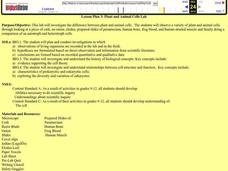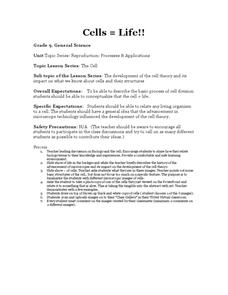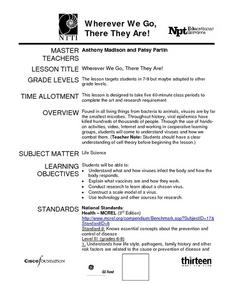Curated OER
Animal and Plant Cell Journaling Activity
Jump into the classification of animal and plants cells, through this inviting lesson comparing Elodea leaves and Epithelial cells. Middle school learners will create wet mounts, write journal entries that compare specimens, and finally...
Curated OER
Cell Theory
Students state the three parts of cell theory. They identify the roles of the nucleus and cell membrane. They take notes from the overhead on cell theory. They answer true/false questions about cell theory.
Curated OER
Plant and Animal Cells
Students investigate the difference between plant and animal cells. They observe a variety o plant and animals cells by looking at a piece of cork, an onion, elodea, prepared slides of paramecium, human bone, frog blood, and human...
Curated OER
Cell Organelles
Young scholars explore biology by researching living cells. In this living organism lesson, students participate in a role-playing activity in which all the young scholars in class form one plant cell by portraying specific parts of a...
Curated OER
Cell Structure and Function
Learners compare the organelles present in plant and animal cells. In this biology lesson, students create an analogy to easily remember their assigned organelles. They also research their function and write a creative story.
Curated OER
Gaia: The Wisdom of the Earth
Learners are introduced to Gaia theory of natural homeostasis. They graph Earth's temperatures over time, construct terrariums or monitor the outdoor environment. Related videos titles are suggested, but may be outdated. The objectives...
Curated OER
Cells=Life!
Ninth graders share what they know about cells. In this biology lesson, 9th graders study different microscopic images of the cell. They draw one and explain to their partner why they chose that image.
Curated OER
Yeast Cells and Their Environment
Middle schoolers create their own experiment in which they have yeast cells growing in liquid environments. They examine the relationship between humans and microorganisms. They also practice using the scientific method.
Curated OER
Evolution
Pupils research the theory of evolution and the controversy. In this evolution lesson students view a film on Charles Darwin then they write an essay about whether or not intelligent design should be taught in science class.
Curated OER
Human Cloning: Is it Biological Plagiarism?
Is cloning good or harmful? Help your class understand the risks and benefits as they read, research, and discuss human cloning. Individuals form teams, research information, and present to the class before concluding with an in-depth...
Curated OER
Graphing Absolute value Inequalities
High schoolers investigate the concept of inequalities and practice graphing them at various degrees of difficulty. They review the basic rules with the teacher at the level of theory which may make it harder for them to understand...
Curated OER
Is There Really Life on Mars?
Pupils examine the work of scientists and determine how they test their theories.
Curated OER
Cloning
Students view the history to cloning cats. Students show examples of what they know about cloning. Students surf the net on all theories on cloning. Students view the critics views on cloning.
Curated OER
Wherever We Go, There They Are!
The central video for this lesson is not available through the included resource link. However, the activity that simulates the passing of a virus through a population is impacting and the other resource links are invaluable. Use this...
Curated OER
Human Embryology
Ninth graders are introduced to the concept of human embryology. Individually, they complete an exercise in which they determine which trait they got from which family member. In groups, they identify and label the reproductive organs...
Curated OER
Light Microscopes
Seventh graders study the parts of a light microscope, and its proper use. They identify each part and explain why it is important to know how to use this tool. They practice observing newsprint on a wet mount slide.

















